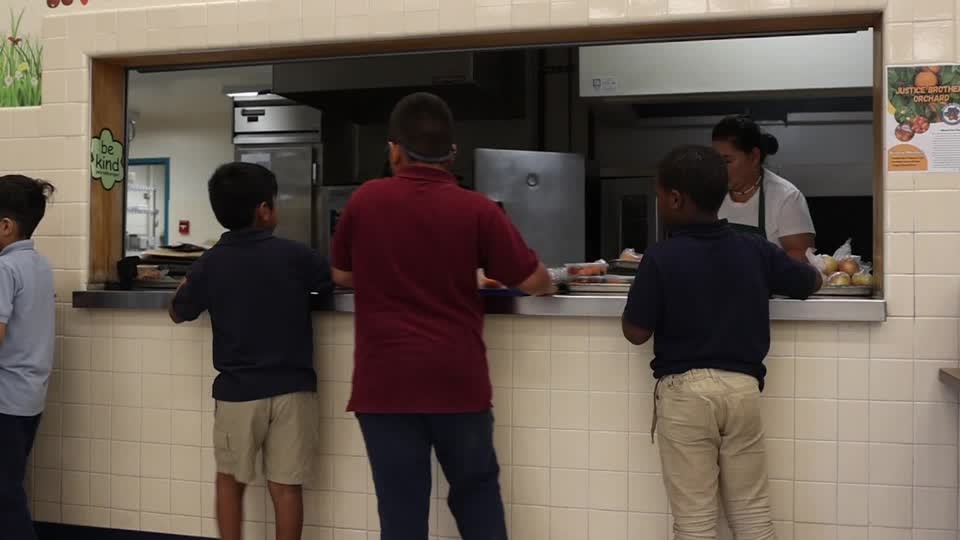STORY: In a school cafeteria in Tucson, Arizona, students weigh up their choices for lunch.
Mandarin oranges, cherry tomatoes and butter lettuce are on offer.
It’s a far cry from what parents remember of “mystery meat” school lunches from over 20 years ago…
:: Lindsay Aguilar, Food Services Director, Tucson Unified School District
“Whether it’s looking at cancer or heart disease or diabetes, all of these things, the research has been done to show that diets high in fruits and vegetables, right, have a positive influence on lowering as you progress through your life.”
Lindsay Aguilar oversees the nutrition program in Tucson district schools.
These fruit and vegetables have been supplied with the help of the federal Local Food for Schools Cooperative Agreement Program.
But in March, the U.S. Department of Agriculture canceled LFS – part of President Donald Trump’s plans to gut the federal government.
At the same time, Health and Human Services Secretary Robert F. Kennedy Jr. has accused schools of feeding children unhealthy food.
The contradiction is not lost on Aguilar –
Leaving her and nutrition directions across the country scrambling for funds to continue farm-to-school programs.
“Having fresh produce as part of our meal program is often – it could be the only exposure that students are getting to that, it exposes these students from you know low-income populations to a variety of fruits and vegetables that they have never seen or got to experience or taste.”
A reliance on federal food support stands in sharp contrast to the area’s thriving food scene.
But outside culinary circles, hunger haunts many homes.
Brenda Encinas is the principal at John B. Wright Elementary School.
:: Brenda Encinas, Principal, John B. Wright Elementary School
“One of the first graders mentioned that to the teacher, ‘There was no dinner, so I ate ice-cream.’ So they eat a lot of chips, whatever they can find easy to grab because there was – either because they didn’t have the funds to buy groceries or because they did not have the family support of somebody making food at home.”
In the Tucson district, 29.5% of families received government food benefits in the last 12 months according to the National Center for Education Statistics – well above the national average.
Many live in so-called food deserts – where access to affordable, fresh food is limited, and big grocery stores are far away.
All this makes school lunches crucial.
All students in the Tucson Unified School District benefit from a program which allows the country’s highest poverty schools to serve free food without collecting individual applications.
“Our school is what provides security to our students. So school becomes their secure place where they have a meal in the morning, in the afternoon for lunch.”
But Aguilar and others like her are also battling perceptions, buoyed by Kennedy – that school nutrition is poor – even dangerous.
The Health Secretary regularly assigns schools blame for chronic illnesses affecting American children.
And has focused his “Make America Healthy Again” campaign on the risks posed by synthetic dyes, additives and ultra-processed food.
Kennedy and a department spokesperson did not respond to a request for comment.
Aguilar says these ingredients were rarely found in Tucson schools.
And that her school district has been building relationships with local farmers since 2015.
Joe Marlow owns Southwinds Farm in Benson, Arizona, about 56 miles away.
He grows cucumbers and tomatoes for the school system.
:: Joe Marlow, Owner, Southwinds Farm
“Having local schools to buy the product is just so nice in a bunch of ways. One thing, it’s a five-mile delivery… There’s also small businesses. And farms are really, they’re very lumpy cash flows, and so it irons out that cash flow, which is huge.”
Marlow says the produce that goes to schools is a significant part of the farm’s budget.
But that with the uncertainty surrounding funding for LFS, his farm will need to branch out.
“We’ll just have to chase down more markets. That’s really the only way to make it happen, and we’ll have to make that up.”
The disconnect between departments in Trump’s administration is troubling nutrition directors nationwide.
While the government has slashed LFS, Kennedy has accused schools of not supplying children with food that’s nutritious enough.
Caught in the middle are schools like John B. Wright Elementary.
“Well, there’s no way we can continue to make students healthy when they don’t have the funds at home. Without the funds, we cannot, we wouldn’t be able to do it. We would have to rely on parents and that doesn’t happen in many of our students’ families.”


